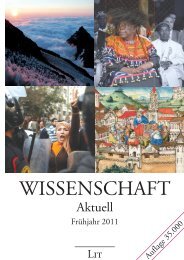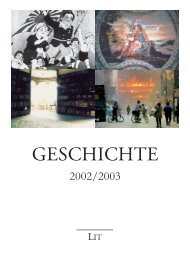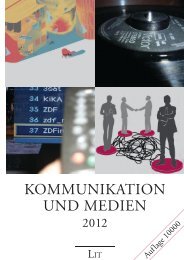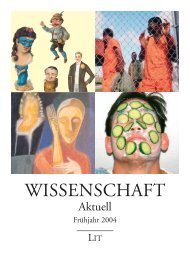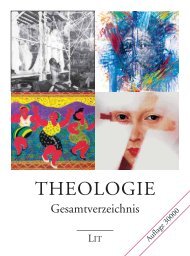ANTHROPOLOGY
ANTHROPOLOGY
ANTHROPOLOGY
Erfolgreiche ePaper selbst erstellen
Machen Sie aus Ihren PDF Publikationen ein blätterbares Flipbook mit unserer einzigartigen Google optimierten e-Paper Software.
Europäische Ethnologie<br />
Gabriele Ponisch<br />
„ . . . daß wenigstens dies keine Welt von Kalten<br />
ist ... “<br />
Wallfahrtsboom und das neue Interesse an Spiritualität und Religiosität<br />
Religion gilt aktuell als Megatrend. Die Institution Kirche jedoch verliert<br />
in Europa an Bedeutung. Elemente aus östlichen Religionen, Esoterik,<br />
Mythologie und Psychotherapie werden kombiniert und in die alltägliche<br />
Lebenspraxis integriert. Viele Menschen treten aus der Kirche aus. Gleichzeitig<br />
nehmen aber immer mehr an Wallfahrten teil, und auch die Zahl<br />
der Wallfahrten steigt kontinuierlich. Dies scheint widersprüchlich. Wie<br />
ist diese Entwicklung deutbar? Welche gesellschaftlichen Prozesse lösten<br />
sie aus und verstärken sie? Welche Sehnsüchte drücken sich im Interesse<br />
an Spiritualität aus? Auf welche Defizite verweisen sie? Welche Funktion<br />
kommt Ritualen in diesem Zusammenhang zu?<br />
Bd. 7, 2008, 296 S., 29,90 €, br., ISBN 978-3-8258-1070-2<br />
Robert Lorenz NEU<br />
„Wir bleiben in Klitten“<br />
Zur Gegenwart in einem ostdeutschen Dorf<br />
Klitten, ein Dorf in der Oberlausitz, in den Jahren 1986 – 2003: Von der<br />
Braunkohlepolitik der DDR zur Abbaggerung bestimmt, gelingt der Gemeinde<br />
in den Tagen des Wendeherbstes 1989 die Rettung aus eigener<br />
Kraft. Den Schwung dieser Wiedergeburt nimmt sie in die 1990er Jahre<br />
mit. Doch bald werden die Probleme einer schrumpfenden Gesellschaft im<br />
Dorf spürbar.<br />
Die Studie folgt den Prozessen dörflicher Vergemeinschaftung aus Akteurssicht,<br />
spürt dabei den feinen Haarrissen des Sozialgefüges „Dorf“<br />
nach und fragt nach den lokalen Handlungsmöglichkeiten in der ländlichen<br />
Peripherie Ostdeutschlands.<br />
Bd. 8, Herbst 2010, 104 S., 19,90 €, br., ISBN 978-3-8258-1644-5<br />
Volkskunde<br />
Editha Hörandner; Stefan Benedik Karner(Hrsg.)<br />
„Durch die Jahre ist es immer besser geworden“<br />
Alltagsbewältigung in der Steiermark 1945 – 55<br />
Bd. 13, 2007, 392 S., 29,90 €, br., ISBN 978-3-8258-0462-6<br />
EAST EUROPE / OSTEUROPA<br />
Ethnologia Balkanica<br />
Journal for Southeast European Anthropology/Zeitschrift<br />
für die Anthropologie Südosteuropas/Journal<br />
d’anthropologie du sud-est européen<br />
Editor-in-chief: Prof. Klaus Roth, Co-editor: Dr. Ulf Brunnbauer<br />
Klaus Roth; Ulf Brunnbauer (Eds.)<br />
Urban Life and Culture in Southeastern Europe<br />
Anthropological and Historical Perspectives<br />
vol. 10, 2007, 368 pp., 29,90 €, pb., ISBN 978-3-8258-9903-5<br />
Klaus Roth; Ulf Brunnbauer (Eds.)<br />
Region, Regional Identity and Regionalism in Southeastern<br />
Europe<br />
Part 1<br />
vol. 11, 2008, 304 pp., 29,90 €, pb., ISBN 978-3-8258-1387-1<br />
Klaus Roth; Ulf Brunnbauer (Eds.)<br />
Region, Regional Identity and Regionalism in Southeastern<br />
Europe<br />
Part 2<br />
The contributions to this second volume focus equally on tangible and<br />
intangible dimensions of Southeast European regions. They represent the<br />
region both as a territorial unit and as a mental construct laden with symbolic<br />
meaning. The papers demonstrate that regions, be it the entire Balkan<br />
Peninsula or be it a small area somewhere in the mountains, can become<br />
palpable, visible, and audible. They can produce culture and they can, at<br />
the same time, be products of culture: regions can be constructs of those<br />
who inhabit them - or of spatial planning from “above”. In any case, both<br />
East Europe / Osteuropa<br />
Studies on South East Europe<br />
Karl Kaser<br />
Patriarchy after Patriarchy<br />
Gender Relations in Turkey and in the Balkans, 1500 – 2000<br />
the physical and the symbolic regions are a very relevant issue in Southeast<br />
Europe, serving purposes of spatial, ethnic, religious or even professional<br />
identification, or of politically motivated border-drawing.<br />
vol. 12, 2009, 272 pp., 29,90 €, pb., ISBN 978-3-643-10107-5<br />
Balkanologie<br />
Beiträge zur Sprach- und Kulturwissenschaft<br />
hrsg. von Thede Kahl, Michael Metzeltin, Gabriella Schubert und<br />
Christian Voss<br />
Bajazid Elmaz Doda unter Mitwirkung von Franz Baron Nopcsa<br />
Albanisches Bauernleben im oberen Rekatal bei Dibra<br />
(Makedonien)<br />
Herausgegeben von Robert Elsie<br />
Bd. 1, 2007, 216 S., 19,90 €, br., ISBN 978-3-8258-0711-5<br />
Thede Kahl<br />
Hirten in Kontakt<br />
Sprach- und Kulturwandel ehemaliger Wanderhirten (Albanisch,<br />
Aromunisch, Griechisch)<br />
Die Hirtengesellschaften Südosteuropas haben durch ihre Wanderungen<br />
zur Ausbreitung zahlreicher kultureller Phänomene in weiten Räumen<br />
Südosteuropas beigetragen, gleichzeitig aber durch die Geschlossenheit<br />
ihrer Gesellschaften die eigene Kultur gut bewahren können. Die<br />
Wanderhirten unterliefen durch die Aufgabe ihrer ausgedehnten Herdenwanderungen<br />
im 20. Jahrhundert einen tiefgreifenden Wandel. Einerseits<br />
kam es zum Abbruch der gewachsenen Kontaktsituationen, andererseits<br />
entstanden durch Sesshaftwerdung und berufliche Neuorientierung zahlreiche<br />
neue Konstellationen des Kulturkontaktes. Die hierbei ablaufenden<br />
Prozesse stehen im Zentrum des Interesses. Obwohl die untersuchten<br />
Sprachen – Albanisch, Aromunisch und Griechisch – unterschiedlichen<br />
Sprachfamilien angehören, sind sie durch zahlreiche Gemeinsamkeiten<br />
miteinander verbunden. Da es besonders viele verbindende Elemente<br />
in der Kultur der Wanderhirten gibt, berührt die Untersuchung eine der<br />
Kernfragen der Balkanologie.<br />
Bd. 2, 2008, 384 S., 29,90 €, br., ISBN 978-3-8258-0944-7<br />
LIT<br />
Studies on South East Europe<br />
edited by Univ.-Prof. Dr. Karl Kaser (Graz)<br />
Christian Promitzer; Klaus-Jürgen Hermanik; Eduard Staudinger<br />
(eds.)<br />
(Hidden) Minorities<br />
Language and Ethnic Identity between Central Europe and the<br />
Balkans<br />
vol. 5, 2009, 304 pp., 29,90 €, pb., ISBN 978-3-643-50096-0<br />
Karl Kaser<br />
Patriarchy after Patriarchy<br />
Gender Relations in Turkey and in the Balkans, 1500 – 2000<br />
vol. 7, 2008, 328 pp., 34,90 €, pb., ISBN 978-3-8258-1119-8<br />
Margit Rohringer<br />
Der jugoslawische Film nach Tito<br />
Konstruktionen von kollektiven Identitäten<br />
Bd. 8, 2008, 344 S., 29,90 €, br., ISBN 978-3-8258-1289-8<br />
Andreas Hemming; Gentiana Kera; Enriketa Pandelejmoni (Eds.)<br />
NEU<br />
Albania<br />
Family, Society and Culture in the 20th Century<br />
Bd. 9, Fall 2010, ca. 304 S., ca. 29,90 €, pb., ISBN 978-3-643-50144-8<br />
Sabine Rutar (Ed.) NEU<br />
Southeast Europe – Comparison, Entanglement,<br />
Transfer<br />
Contributions to European Social History of the 19th and 20th<br />
Centuries<br />
The purpose of this book is to show how current and future research on the<br />
social history of the Balkans can be integrated into a broader European framework.<br />
The contributors look at a range of methodological and empirical<br />
issues. The theme that links the various studies is that of the contrasting,<br />
yet at the same time entangled ideas of the Balkans as a “mental map”<br />
–21–<br />
(Maria Todorova) and of Southeast Europe as an “historical region” (Holm<br />
Sundhaussen).<br />
vol. 10, Fall 2010, ca. 536 pp., ca. 49,90 €, pb., ISBN 978-3-643-10658-2<br />
Aleksandar R. Miletić NEU<br />
Journey under Surveillance<br />
The Overseas Emigration Policy of the Kingdom of Serbs, Croats<br />
and Slovenes in Global Context, 1918 – 1928<br />
The government restrictions on inter-state migration imposed as a result<br />
of the violence of WWI had a considerable impact around the world. This<br />
monograph explores the local Yugoslav particularities of these changes<br />
by examining the administrative development of its emigration offices.<br />
The book covers the official and unofficial policies, institutional and extrainstitutional<br />
frameworks, and is therefore able to address several related<br />
topics such as the state’s hidden minority policy and the widespread corruption<br />
and misconduct in the administration of emigration procedures.<br />
It also includes one chapter dedicated specifically to the issue of statefacilitated<br />
surveillance over female emigration.<br />
Bd. 11, Fall 2010, ca. 184 S., ca. 19,90 €, pb., ISBN 978-3-643-50188-2<br />
Karl Kaser NEU<br />
The Balkans And The Near East<br />
Introduction To A Shared History<br />
The Balkans and the Near East share millennia of a joint history, which<br />
stretches from the settling of the human being to the 20 th century. The task<br />
split between the various scholarly disciplines into the fields of Balkan<br />
studies and Near (Middle) East studies has resulted in dividing a shared<br />
history into various sub-histories. The aim of the monograph is to reunite<br />
these isolated histories. Therefore, this monograph opens up completely<br />
new historical perspectives.<br />
Bd. 12, Fall 2010, ca. 280 S., ca. 29,90 €, pb., ISBN 978-3-643-50190-5<br />
Balkan Border Crossings<br />
Contributions to Balkan Ethnography<br />
edited by Vassilis Nitsiakos (University of Ioannina, Greece)<br />
Vassilis Nitsiakos NEU<br />
On the Border<br />
Transborder Mobility, Ethnic Groups and Boundaries along the<br />
Albanian-Greek Frontier<br />
The flow of emigrants from Albania to Greece, being one-sided, indicates<br />
a relation of inequality between the two countries. Indeed, the violence<br />
with which the collapse of the regime is effected and the subsequent opening<br />
of the border and the, as a rule, undocumented way of entering Greece,<br />
makes this relation even more asymmetrical and places the moving<br />
ones in a much more powerless position, as they live and work illegally:<br />
their “outlaw” status deprives them of all rights. Legalisation improves<br />
their position but does not cancel the structural inequality that characterises<br />
the phenomenon of immigration any way, as well as the quality of the<br />
immigrant. In any case, the effort of the immigrants to present aspects of<br />
identity that would facilitate their position and residence (proofs of Greek<br />
roots or Christian faith, changes of names, etc.) demonstrates, precisely,<br />
how they experience this unequal relationship, which is further aggravated<br />
by factors pertaining to their otherness.<br />
vol. 1, 2010, 504 pp., 49,90 €, pb., ISBN 978-3-643-10793-0<br />
Analysen zur Kultur und Gesellschaft im<br />
östlichen Europa<br />
hrsg. von Wolfgang Eichwede<br />
Isabelle de Keghel<br />
Die Staatssymbolik des neuen Russland<br />
Traditionen – Integrationsstrategien – Identitätsdiskurse<br />
Seit dem Systemwechsel von 1991 hat die Staatssymbolik Russlands einen<br />
mehrstufigen Reformprozess durchlaufen, bei dem der Rekurs auf Elemente<br />
der vorrevolutionären und der sowjetischen symbolischen Ordnung<br />
eine wichtige Rolle spielte. Daher bildet ein historischer Überblick über<br />
die Staatssymbolik Russlands vom Mittelalter bis zum Ende der Sowjetzeit<br />
den Ausgangspunkt der Studie. Vor diesem Hintergrund werden die<br />
Staatssymbolik-Reformen der Ära El’cin und Putin sowie die öffentlichen<br />
Debatten zum Thema analysiert. Darauf folgt eine Untersuchung zur<br />
Rezeption sowjetischer und postsowjetischer Staatssymbole, die sich auf<br />
Umfragen russländischer Institute und auf qualitative Interviews der Autorin<br />
stützt. Der umfangreiche Anhang der Arbeit enthält u.a. den Text der<br />
Nationalhymnen Russlands vom 19. Jh. bis heute, außerdem eine Auswahl<br />
von Wappen und Flaggen Russlands bzw. der UdSSR.<br />
Bd. 21, 2009, 296 S., 24,90 €, br., ISBN 978-3-8258-8862-6




